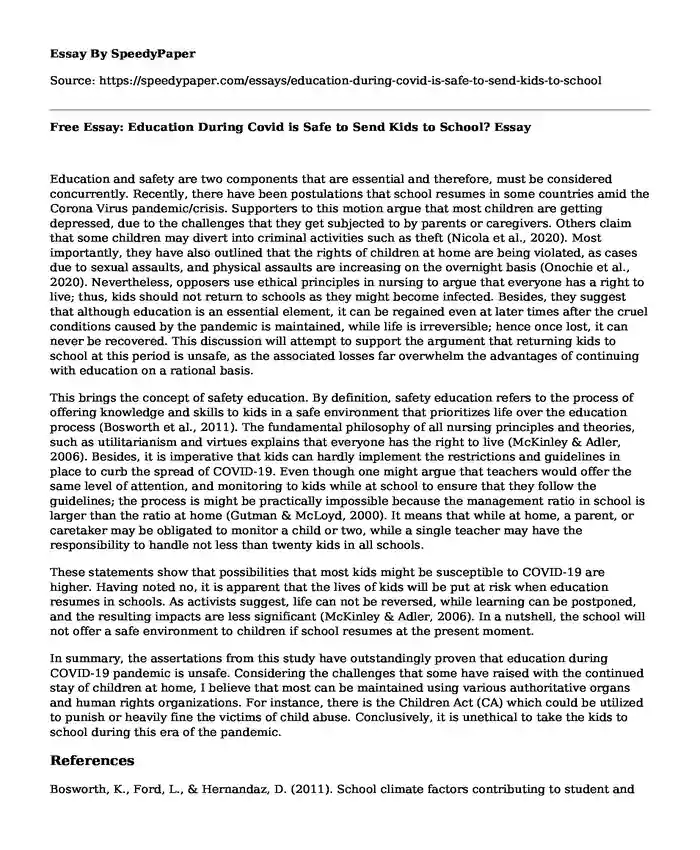
| Type of paper: | Essay |
| Categories: | School Covid 19 Social issue |
| Pages: | 3 |
| Wordcount: | 697 words |
Education and safety are two components that are essential and therefore, must be considered concurrently. Recently, there have been postulations that school resumes in some countries amid the Corona Virus pandemic/crisis. Supporters to this motion argue that most children are getting depressed, due to the challenges that they get subjected to by parents or caregivers. Others claim that some children may divert into criminal activities such as theft (Nicola et al., 2020). Most importantly, they have also outlined that the rights of children at home are being violated, as cases due to sexual assaults, and physical assaults are increasing on the overnight basis (Onochie et al., 2020). Nevertheless, opposers use ethical principles in nursing to argue that everyone has a right to live; thus, kids should not return to schools as they might become infected. Besides, they suggest that although education is an essential element, it can be regained even at later times after the cruel conditions caused by the pandemic is maintained, while life is irreversible; hence once lost, it can never be recovered. This discussion will attempt to support the argument that returning kids to school at this period is unsafe, as the associated losses far overwhelm the advantages of continuing with education on a rational basis.
This brings the concept of safety education. By definition, safety education refers to the process of offering knowledge and skills to kids in a safe environment that prioritizes life over the education process (Bosworth et al., 2011). The fundamental philosophy of all nursing principles and theories, such as utilitarianism and virtues explains that everyone has the right to live (McKinley & Adler, 2006). Besides, it is imperative that kids can hardly implement the restrictions and guidelines in place to curb the spread of COVID-19. Even though one might argue that teachers would offer the same level of attention, and monitoring to kids while at school to ensure that they follow the guidelines; the process is might be practically impossible because the management ratio in school is larger than the ratio at home (Gutman & McLoyd, 2000). It means that while at home, a parent, or caretaker may be obligated to monitor a child or two, while a single teacher may have the responsibility to handle not less than twenty kids in all schools.
These statements show that possibilities that most kids might be susceptible to COVID-19 are higher. Having noted no, it is apparent that the lives of kids will be put at risk when education resumes in schools. As activists suggest, life can not be reversed, while learning can be postponed, and the resulting impacts are less significant (McKinley & Adler, 2006). In a nutshell, the school will not offer a safe environment to children if school resumes at the present moment.
In summary, the assertations from this study have outstandingly proven that education during COVID-19 pandemic is unsafe. Considering the challenges that some have raised with the continued stay of children at home, I believe that most can be maintained using various authoritative organs and human rights organizations. For instance, there is the Children Act (CA) which could be utilized to punish or heavily fine the victims of child abuse. Conclusively, it is unethical to take the kids to school during this era of the pandemic.
References
Bosworth, K., Ford, L., & Hernandaz, D. (2011). School climate factors contributing to student and faculty perceptions of safety in select Arizona schools. Journal of School Health, 81(4), 194-201. https://onlinelibrary.wiley.com/doi/abs/10.1111/j.1746-1561.2010.00579.x
Gutman, L. M., & McLoyd, V. C. (2000). Parents' management of their children's education within the home, at school, and in the community: An examination of African-American families living in poverty. The Urban Review, 32(1), 1-24.
McKinley, K., & Adler, G. (2006). Quality of life in nursing homes: involving elders in policy-making for their care and life satisfaction. The Social Policy Journal, 4(3-4), 37-51. https://www.tandfonline.com/doi/abs/10.1300/J185v04n03_03
Nicola, M., Alsafi, Z., Sohrabi, C., Kerwan, A., Al-Jabir, A., Iosifidis, C., ... & Agha, R. (2020). The socio-economic implications of the coronavirus and COVID-19 pandemic: a review. International Journal of Surgery. https://www.sciencedirect.com/science/article/pii/S1743919120303162
Onochie, L. A., & Jallow, Y. A. (2020). COVID-19 Social Distancing: Impacts and Consequences to Human Association (A Review of Psychological Trauma Caused by Corona Virus). Available at SSRN 3636229. https://papers.ssrn.com/sol3/papers.cfm?abstract_id=3636229
Cite this page
Free Essay: Education During Covid is Safe to Send Kids to School?. (2023, Sep 28). Retrieved from https://speedypaper.net/essays/education-during-covid-is-safe-to-send-kids-to-school
Request Removal
If you are the original author of this essay and no longer wish to have it published on the SpeedyPaper website, please click below to request its removal:
- Free Essay Sample. Cancer of the Brain
- Essay Sample on Stress and the Mental Health of Children
- Essay Sample on Diagnostic and Clinical Reasoning Paper on Acute Pharyngitis
- Free Essay. the Role of Aprns in an Aging Population
- Free Essay Example - Mentalism
- Essay on Empowering Education: The Necessity of Comprehensive Sex Education in Public Schools
- Complications of Cardiac Catheterization - Essay Sample
Popular categories




